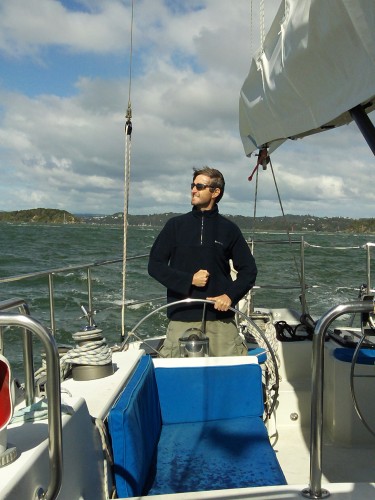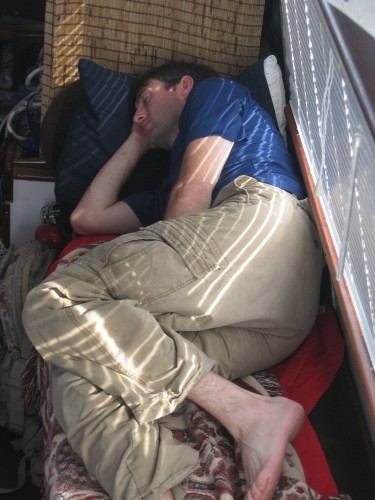This is the third in a 3 part series on how to prevent and overcome seasickness by Greg. Take a look at the first two articles.
Mindset is critical. After all, seasickness is all in your head. No, seriously, it is (and yes, that means it’s all in my head too).
The short explanation for the reason people get seasick is that their mind is attempting to compensate their sense of balance with what they see and feel. (Long explanation here.) On a boat, what people see and feel for motion don’t always line up like they do on land. The mind gets confused in a new environment with odd motions and then wham, down you go.
So can someone literally think them self sick? Yes. Yes they can. That’s another reason for all the preventative methods. Dumbo has his feather and I have my eucalyptus oil. Placebo or not, who cares? It works and I even smell better than Dumbo. The good news is that you can also use the same mental effect to feel better. Though there is no cure for seasickness, I have witnessed time and again people feeling significantly better when forced to steer the boat by hand.

Yes people, the ship’s auto pilot is the enemy here – turn it off. There are a few possible explanations for why this works:
- Steering by hand gives the driver a heightened awareness of, and control over, the motions of the boat. The same way a carsick passenger feels better when they take control of the motions of a winding road by driving.
- Steering a sailboat by hand and maintaining a course requires a good deal of concentration: watching the compass, the sails, not to mention the other boats in the area & correlating that all to the radar and the chart. This distracts the helmsman from thinking about being sick.
- Driving forces the helmsman to look at the horizon, which is the only fixed object in the completely relative world of sailing. Looking at the horizon does in fact help – it allows what one is feeling to align with the motions one is seeing.
- Driving puts the wind in your face. Fresh air helps.
In the end, it doesn’t really matter why as long as it works. When done early enough steering usually helps and after a few minutes the driver just forgets to be sick. Just so you know, people who are starting to get sick never want to drive. They want to sit on their butt and think about getting sick. Don’t let them. Stage an intervention for their own good. Ignore their protests and put them on them the helm. They will thank you later.
Also, sleep helps. I don’t know why but usually after a night’s rest while at sea people feel better. This is little consolation to people who are already sick though, because as you might guess falling asleep while sick is darn near impossible.
We should take a moment to confront the question of “chronic seasickness” and expose it for what it is and is not. Just because you get seasick does not mean you have “chronic seasickness” it just means you get seasick like most other normal human beings. The average person (like me, in this case) gets seasick if they fail to take preventative measures. Some worse than others but the overwhelming majority of humans on this planet have a form of preventable seasickness. Yes, I know, believe me I know from personal experience that yours feels horrible, that you would honestly just love it if someone would throw you overboard because somehow it feels like that might help, but that doesn’t mean it’s chronic. Truth is, if you can handle riding in a car without collapsing then it’s very unlikely you have chronic seasickness and pretty likely you’re just still breaking in your sea legs. Remember that the best cure for seasickness is prevention.
That being said, there is a very small percentage of the population that has an extreme sensitivity to motion sicknesses, which includes seasickness. If you are actually concerned that you are one of the RIDICULOUSLY few people on this planet that actually has chronic seasickness you should see your doctor who can tell you for sure and has more robust cures for motion sickness (everything from over the counter stuff, to medicated patches you wear, to prescription meds, all the way up to injections.

Yes, you can get a seasickness shot. And yeah, I’ll smear essential oils on my ears to avoid that too.)
This brings up our final point on overcoming seasickness. As we have said before, in boating it’s always best to start small and work your way up as you gain confidence. Don’t have your first time on a ship be the start of a transatlantic race because that kind of sailing is physically and mentally demanding. Beating down your mind and body by immediately jumping into challenging sailing will dramatically increase your chances of getting sick. So be smart, set yourself up for success and work up to it. Go check out our article on how to test the waters, start with some of those cheap and free ideas to grow some healthy sea legs and let your body adjust to this new environment gradually before you go all Davy Jones on us. It doesn’t take very long and you’ll be much happier for it.
As someone who has been there before I know how horrible seasickness can be. If you have any other questions or if I haven’t covered something in these three articles, please send us an email or leave a comment with your question and we’ll get you an answer as soon as we’re in port again.
Greg and Tiffany are traveling around the world on sailing yachts and keep a video blog of their (mis)adventures. If sailing to Tahiti on a 44 ft sailboat, 3-day delays for wine tastings, getting pooped on by seagulls, opening coconuts with dull machetes, sailing past tornadoes and ukulele Christmas carols are for you, then check them out at www.CoastGuardCouple.com!




++ for keeping eyes on the horizon and getting fresh air. I’m sitting in the lab and it’s a bright and sunny out and even now I get queasy just thinking about crawling belowdeck to sleep in a rolling boat with diesel fumes permeating the hold
truth.
My daughter and I enjoyed fishing in my 14 foot boat for years. She was ten years old when my charming ex-wife told her all about sea sickness. That ended my daughter’s sea legs forever. It also solidified my belief that its all in your head. Do you know of any studies with children subjects to back this theory up?
Unfortunately I don’t. Most of our knowledge we’ve learned through experience or word of mouth. I did a quick online search and found this study though: http://www.australianprescriber.com/magazine/32/3/61/3/ Hope it helps you both!